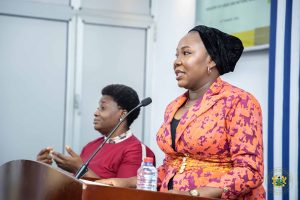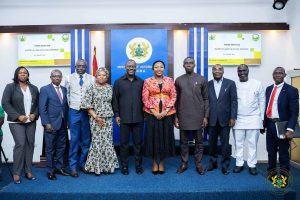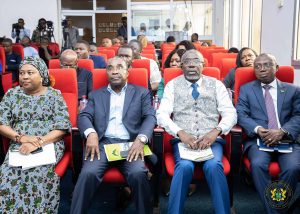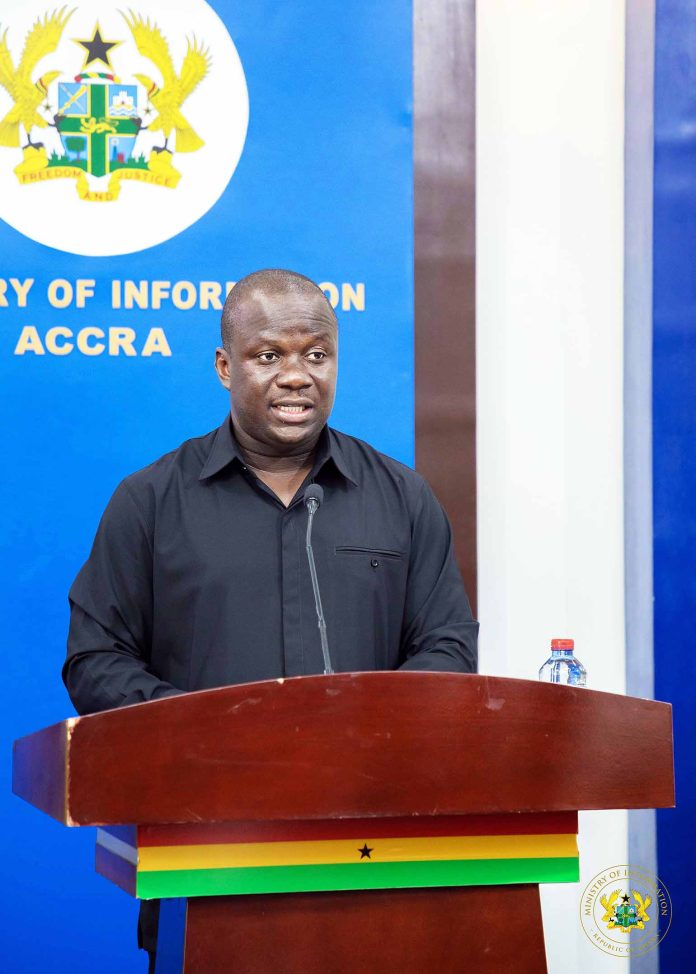On behalf of the Ministry of Lands and Natural Resources, I thank, most sincerely, the Ministry of Information and its hardworking and ever supportive Minister, Hon. Fatimatu Abubakar, for giving us this platform to update the Ghanaian people on the state of Ghana’s public lands. This forms part of our efforts to regularly update the nation on the management and utilisation of the lands and natural resources of our country.
You will recall that not too long ago, at this same venue, I led the three main Commissions under the Ministry of Lands and Natural Resources, namely, the Lands, Minerals and Forestry Commissions, to brief the nation, through this very medium, on the various programmes and policies that were being implemented to effectively and efficiently manage our lands and natural resources.
This was followed by specific Press Briefings on the management of our mineral resources, and the state of Ghana’s forests. And today, we turn our attention to land, and particularly, the protection and management of our public lands.

We do this because the public lands and natural resources of our country are, by virtue of our national Constitution, the property of the people of Ghana, vested in the President of the Republic, for and on behalf of the Ghanaian people. As trustees of these resources, we have a duty to account to you, the beneficiaries of these resources, which is why we undertake these regular exercises.
We are extremely grateful to you, the media, for always responding to our invitation and carrying our message to the country. It is our hope that you will once again carry today’s exercise to the length and breadth of our country, and help dispel some of the misinformation that have been put out in the public.
Distinguished Guests, Ladies and Gentlemen, issues of land in our country evokes a lot of emotions, and rightly so, because most of these lands were acquired by families, stools, skins and clans through the toil and blood of our ancestors. And that is why when the colonial Government attempted to vest lands in our country in the British Crown, our forebears, championed by John Mensah Sarbah and the Aborigines’ Rights Protection Society, fiercely fought to reject the law.
Today, unlike most of our compatriots on the continent, lands in our country are, largely, owned by these stools, skins, clans and families. Over the years, however, Governments have acquired some of these lands either by purchase, lease, gift, compulsory acquisition, vesting or through some other modes. These are the lands referred to as public lands which Government has direct control over.
Just as Governments have been acquiring lands, since the inception of our Republic, every Government has granted some of these public lands to private entities for various developmental purposes. Unfortunately, some people have packaged some of these lands which were granted to private developers decades ago and presented them as evidence of what they have termed “State Capture.”
The Ministry has had to issue Press Statements to correct some of these misinformation. However, given that this platform has a wider reach and audience, it is important to reiterate some of these issues which we have already issued statements on.
One of such lands is the land which hosted the Bulgarian Embassy. This land forms part of a larger parcel of land acquired by the State in 1920 by a Certificate of Title dated 6th July 1920. The land was however granted to one Theophilus Kofi Leighton as far back as 1977, for a term of 99 years commencing from 1st April 1974. This Lease will expire in the year 2073. Until then, Government has no direct control over the use of the land.
After building on the land, the said Mr. Leighton entered into a private contract with the Bulgarian Embassy and rented the house to the Embassy for short-term periods, before granting them a fifty-year sublease. However, by a letter dated 5th November, 1990, the then Ministry of Foreign Affairs declared the sublease to the Bulgarian Embassy as void.
Events following this declaration resulted in series of litigations, some of which are still pending in our courts. According to the Sole Inquirer appointed to investigate the demolishing of the building, it was demolished by one Jojo Hagan, said to be the Executor of the Will of Mr. Leighton, pursuant to a court order.
As previously stated, the Government of Ghana played no role in the transaction between Mr. Leighton and the Bulgarian Embassy, nor was it party to the contract or the demolishing exercise. Government, however, decided to intervene in the matter due to the involvement of the Bulgarian Embassy which is an accredited diplomatic mission in the country.
The Ministry of Lands and Natural Resources and the Ministry of Foreign Affairs and Regional Integration have engaged the parties involved extensively and have agreed on some compensation for the Bulgarian Embassy which will be paid by those who undertook the demolishing exercise.

For the avoidance of doubt, this compensation will not be paid by the Government of Ghana. Government will, however, continue to engage the parties until the matter is fully resolved. Ladies and Gentlemen, how is this evidence of State capture?
Then there is the issue of a land belonging to the Prisons Service at Roman Ridge, which was leased as far back as 2005, and which matter has gone to court and the court has delivered judgment on the matter. What is the role of the Akufo-Addo/Bawumia Government in a land granted to a private developer as far back as 2005?
Another allegation that has been made as evidence of state capture by this Government is the Parks and Gardens land at Cantonments. This land was acquired in 1894 and granted to the predecessor of the Department of Parks of Gardens in 1952. The land was, however, leased to Wontirim Company Limited on 29th November, 2016, long before the current Government came to power. And those who were in power when the land was leased in 2016 have turned around to falsely accuse the Akufo-Addo/Bawumia Government of selling this land.
Indeed, the lease was made pursuant to a request from the then Ministry of Local Government and Rural Development, dated 16th August, 2012, under the hand of its then Deputy Minister, Hon. Elvis Afriyie Ankrah, to sell two (2) acres of the land “to enable [the Department of Parks and Gardens] raise the needed funding to resource itself.” According to the then Deputy Minister, “proceeds from the sale shall be used to provide Parks and Gardens with a new office, staff bus, some tractors, water tankers and the needed hand tools it is currently in dire need of, to restructure and reposition itself as a viable government agency.”
And yet, even though the land was leased in 2016, in accordance with the Minister’s request, we haven’t seen the new office complex of the Department of Parks and Gardens, the water tankers, the tractors, and all the other things that the proceeds of the sale were supposed to be used for.
Again, there are allegations that this Government has sold some bungalows belonging to the Judicial Service in Cantonments to the private developers. These bungalows in question, were, however, sold as far back as 13th July, 2015 to Frimps Oil Company Ltd., following an approval granted by the then Minister for Lands and Natural Resources, Hon. Nii Osah Mills, on 2nd June, 2015. Is it, therefore, not surprising that the very people who supervised the sale of this property to Frimps Oil Company Ltd. will turn around and accuse the Akufo-Addo/Bawumia Government of state capture?
For the Du Bois Centre, as we explained in the Press Release of 16th July, 2024, the Lands Commission, the manager of public lands and the repository of records of land transactions, has no pending application for the transfer of this land. The land, as we speak, remains in the name of the Du Bois Centre.
Ladies and Gentlemen, the above examples clearly show that the allegations of state capture and the narrative that this Government is indiscriminately selling public lands, are all palpably false, without merit, and, obviously, actuated by political considerations given that we are nearing elections.
Indeed, the evidence shows that the Akufo-Addo/Bawumia Government has been meticulous in protecting public lands in the public interest. On 17th August, 2021, with the approval of the President of the Republic, a policy directive was issued to the Lands Commission, pursuant to article 258(2) of the national Constitution to “refer all transactions relating to the grant of any interest in public land to [the office of the Minister] for prior approval.” This was to ensure that the President of the Republic, in whom these lands are vested, discharges his constitutional duty in an informed manner.
The directive, further, stated that “Any deed executed without the approval of the President through the Minister for Lands and Natural Resources would be deemed void as same would have been done without the authority of the President in whom these lands are vested.”
In Northern Region, for example, the Regional Lands Commission has been directed to reverse a number of leases over public lands granted to private developers without the prior approval of the President of the Republic, in accordance with this Policy Directive. This followed a Report of a three-member Committee the Ministry constituted to investigate allegations of transfer of public lands in the Region. This is a testament to our unwavering commitment to protect public lands in the public interest.
Apart from the above Directive to the Lands Commission, a series of letters have been written to all public institutions to utilise public lands granted them for the purposes for which they were granted only, and not to create any third-party interest in such lands without the express prior approval of the President of the Republic, given through his Minister responsible for Lands.
Just a couple of weeks ago, Cabinet issued further Directive to all public bodies, public institutions and public corporations (including public universities) not to lease, sublet, assign, transfer, dispose of, or otherwise create any third party interest in any public land granted or allocated them without the prior written approval of the President of the Republic.
This Directive, which was subsequently published in the Dailies on Thursday, August 8, 2024, applies to all public lands that have been granted to public institutions, whether by way of freehold, leasehold or any other form of grant.
The days of public institutions entering into public private partnership agreements with public lands without the approval of the President are obviously over, and any person who enters into any such transaction, does so at his/her own risk. All these measures have been put in place to ensure the protection of public lands and to regulate their utilisation.
Aside these preventive measures, pursuant to section 236 of the Land Act, 2020 (Act 1036), which enjoins the State to take steps to recover encroached public lands, the Ministry constituted a Public Lands Protection Team to work with the Lands Commission to protect public lands from encroachment, and recover those that have already been encroached.
The Team, in collaboration with the Lands Commission and the Ghana Police Service, has undertaken a number of operations to recover encroached public lands. The Commission is, also, working with the Ghana Police Service to provide protection for all public lands and prevent them from further encroachment.
We have, also, engaged Ministries Departments and Agencies (MDAs), as well as Metropolitan, Municipal and District Assemblies (MMDAs), to take steps to protect lands acquired for their use, or which fall within the jurisdiction of the Assemblies, in accordance with section 236 of Act 1036.
Distinguished Guests, Ladies and Gentlemen, there is, also, the issue of the State returning lands to preacquisition owners. Let me use this opportunity to make a very important distinction between article 20(6) of our national Constitution, which requires that the State give pre-acquisition owners the first right to acquire compulsorily acquired land when the State no longer has a need for the land, and instances where the State returns portions of compulsorily acquired lands to preacquisition owners in lieu of compensation or some other consideration.

As the Supreme Court explained in Kpobi Tetteh Tsuru III v Attorney General [2010] SCGLR 904, article 20 has a futuristic intention, and does not apply to lands acquired by the State prior to the coming into force of the Constitution. However, since the colonial era, from the Public Lands Ordinance of 1876, through State Property and Contracts Act, 1960 (C.A. 4) to the State Lands Act, 1962 (Act 125), the existing law before the coming into force of the Constitution, the State has always been enjoined to pay compensation for the acquisition of any land.
At all material times prior to the coming into force of the Constitution, therefore, Government was under an obligation to pay compensation for any land compulsorily acquired by the State. In some cases, however, no compensation was paid for the acquisition of these lands.
When Government receives a petition for the release of some of these lands, the petition is examined on its own merits, through series of assessments evaluations and negotiations. Indeed, some of these petitions and negotiations transcends different Governments.
For example, in respect of the Kumasi Sector 18 lands, the Cabinet of President John Dramnani Mahama first approved the Redevelopment Scheme on 1st September, 2016, and authorised the return of fifty percent (50%) of the land affected by the Redevelopment to the Golden Stool in lieu of compensation, which culminated in the publication of the State Lands (Kumasi Sector 18 Redevelopment Project) Instrument, 2021 (E.I. 432).
Suffice to say, Ladies and Gentlemen, that this is not the first time Government has released lands to preacquisition owners.
By E.I. 8 of 2004, Government released some 360 acres of Nungua Otinshie lands, acquired in 1978 for the Centre for Scientific and Industrial Research (CSIR) to the preacquisition owners;
By E.I 15 of 2009, Government released ninety-nine acres (99 acres) of the Adentan land acquired in 1968 for West African Secondary School to the preacquisition owners;
By E.I. 16 of 2009, Government released one hundred and fourteen point zero five five acres (114.055 acres) of the Accra Mpehuasem land acquired in 1974 for the Accra Training College to the preacquisition owners;
By a lease made in 2009, Government released nine hundred and seventy-four point five-three acres (974.53 acres) of the Nungua lands acquired in 1940 for Livestock Farm to the preacquisition owners; and
By E.I. 17 of 8th November, 2012, Government released almost two hundred and fifty acres (250 acres) of the Madina land acquired in 1977 for the Department of Social Welfare to the preacquisition owners.
This list, obviously, is not exhaustive, but only seeks to demonstrate that it is not novel for Government to release public lands to preacquisition owners for one reason or the other. What is important in all these considerations, is the public interest.
Distinguished Guests, while protecting existing public lands, Government has, also, been acquiring additional lands to increase the public land estate of our country to meet our developmental needs, including the thirteen thousand two hundred thirty (13,230)-acre land at Afienya Dawhenya for Industrial Enclave and Urban Development, the five hundred and nine (509)-acre land between Afienya and New Akrade for railway development, and the two hundred and thirty-seven (237)-acre land in Tamale for the University for Development Studies, all acquired in 2018.
Several Schemes are being implemented in Kumasi Sector 18, which comprises of Ridge, Danyame and Nhyiaeso Residential areas, Old Tamale Airport, and Cape Coast Ridge Sectors 1, 2 and 3 Residential Areas.
We are, also, aggressively pursuing a digitalisation programme to digitise the records, including legacy records, of the Lands Commission to promote expeditious land service delivery across the country. Since the introduction of the Enterprise Land Information System (ELIS), the Lands Commission has been vigorous in ensuring seamless migration of manual operations unto the system. And today, selected services of the Commission, such as consolidated searches, stamp duty assessment and payment, plan approval, among others, can be done online from the comfort of your homes.
The Commission, in collaboration with the Ghana Association of Bankers (GAB), has, also, introduced an online portal for banking institutions to assess its services digitally from their offices.
Additionally, the six regional offices of the six new Regions, namely, Ahafo, Bono East, North East, Oti, Savannah, and Western North, operate fully digital. And we are in the final stages of engaging a private partner to work with the Commission to deliver a holistic digitalisation of land services, which will ensure that the Lands Commission and all its Regional Offices, operate fully digital.
Hon. Minister, Friends from the Media, Distinguished Guests, Ladies and Gentlemen, a lot has been achieved within this short period that the Akufo-Addo/Bawumia Government has been in power. But today, the assurance I want to give you, which is evidence from the data we have put out, is that the public lands of our country are safe, and Government is working to protect them while ensuring their judicious use.
The people who sold some of our public lands, which has resulted in some misunderstanding with some public institutions, have turned around to accuse this Government of the very acts they perpetrated. Fortunately, the records are still intact, and we know who sold these lands which have been repackaged as evidence of state capture.
In the spirit of transparency, the President of the Republic, H.E. Nana Addo Dankwa Akufo-Addo, has directed the compilation of a list of all public lands that have been transferred since the inception of the Fourth Republic on 7th January, 1993. A dedicated team of men and women at the Lands Commission are working to put together this list, the details of which would be made known once the exercise is complete.
Let me hasten to add, that the grant of public lands for development, in and of itself, is not wrong. As population grows, with competing needs for land, it becomes necessary to change the use of some of these lands to meet the developmental needs of the nation. For instance, the Labone and South Labone Estates were originally acquired in 1902 for coconut plantation, but had to be given to the State Housing Company to develop into a residential area. The lands at Borteyman, which now hosts the Borteyman Estates, Sports Complex and Aquatic Centre were acquired for livestock farm in 1940. Airport Residential Area, as well as portions of Airport West and East Legon, were originally acquired for aerodrome services, but have been developed into one of the prime areas of our capital city. Cantonments and Switchback residential areas, Parts of Roman Ridge, Dzorwulu and Achimota Residential Area, are just a few of such examples.
Indeed, in the case of Kpobi Tsuru III v Attorney-General [2010] SCGLR 904, Dotse JSC, after citing some examples like the Accra Race Course land which was converted for use as the Accra International Conference Centre, and the Makola No. 2 Market which was converted into a modern car park, concluded that:
“Once the use to which the land is to be put is not restricted to any personal or individual interest, but one to which the general public will have a benefit or the benefit of the project will inure to the entire country either directly or indirectly, the public interest purpose will be deemed to have been adequately catered for.”
The overarching question should, thus, be, what use was the land put to?
Distinguished Guests, Ladies and Gentlemen, as managers of public lands, we are not oblivious of our fiduciary duties to the people of Ghana, and under the able and understanding leadership of President Akufo-Addo and Vice President Dr. Bawumia, we will continue to discharge these duties transparently, anchored on the highest standards of integrity, candour, and utmost good faith, to ensure the protection and the judicious use of public lands in the public interest, and for the ultimate benefit of the people of Ghana, the true owners of these lands.
I thank you for your attention.








